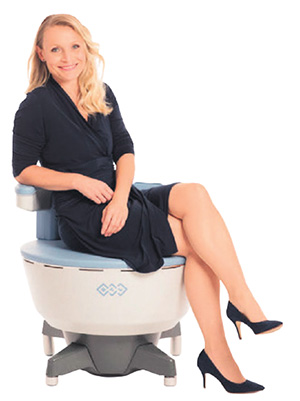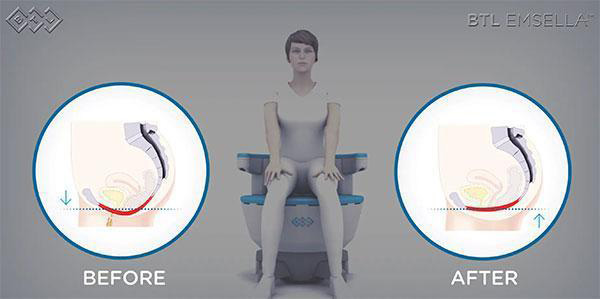
What is Urinary Incontinence?
If you suffer from sudden or unexpected loss of bladder control you are suffering a common symptom of Urinary Incontinence.
Over 200 million people worldwide are affected by incontinence and only half of them seek help.
Types of Incontinence
The types of incontinence include:
- Stress Incontinence occurs when urine leaks after you exert pressure on your bladder typically by coughing, sneezing, laughing, exercising or lifting something heavy.
- Urge incontinence occurs when a strong urge to urinate does not allow you to get to the toilet in time.
- Other forms of incontinence include Overactive Bladder, and Overflow and Faecal Incontinence
Incontinence is an intimate health issue that can cause discomfort, embarrassment, lifestyle restrictions and social isolation.
How Can Incontinence Be Treated?

There are several approaches to treat Stress incontinence these include:
- Electromagnetic Stimulation
- Medications
- Behavioural Modifications
- Pelvic Floor Exercises
- Inserted Devices and Absorbent Pads
- Bulking Agents
- Surgery
Many of these treatments require invasive or ongoing treatment to achieve ongoing bladder control. At Melbourne Arthritis we have an advanced non-invasive therapy for suitable patients.
Electromagnetic Stimulation Therapy for Incontinence
Electromagnetic Stimulation Therapy also referred to as Neuromuscular Stimulation for incontinence is a great option for both men and women of any age who desire a solution for urinary incontinence and improvement in their quality of life.
Patients who have had the treatments can now laugh, exercise and sneeze as they please without experiencing a leak of urine.
Other forms of incontinence include night time urination and urinary flow problem can be aided by Electromagnetic Stimulation Therapy.
What is EMsella Stimulation for Incontinence?
EMsella Electromagnetic Stimulation for urinary incontinence is an advanced and unique technology that revolutionizes intimate health and wellness by providing those suffering from incontinence.
The procedure is a very simple one and can be easily provided at our Melbourne Bladder Clinic.
Benefits of EMsella Incontinence Therapy
The advantage of treating urinary incontinence for both men and women include:
- Completely non-invasive
- Pain-free
- Patients remain fully clothed during the procedure
- No recovery time required
- Walk-in walk-out procedure
- FDA Approved
- There is NO need for anaesthetic, drugs or
- Normal daily activities can be undertaken immediately after the procedure.
- No recovery protocols are involved
One 30 minute session gives the equivalent of 11,200 Kegel Pelvic Floor exercises.
Indications for EMsella Incontinence Therapy
EMsella urinary incontinence treatment may be suggested for both Men & women who develop weakness in the pelvic floor muscles and experience a urinary leak due to:
- Childbirth
- Menopause
- Body aging
- Enlarged prostate
- Post Prostate surgery
- Pelvic floor dysfunction
How Does EMsella Work?
The EMsella Incontinence Therapy uses focused high-intensity electromagnetic energy to stimulate supramaximal pelvic floor contractions.
This energy is transmitted to the vaginal and pelvic floor muscles through your clothes, inducing thousands of pelvic floor contractions. This stimulation is extremely important in patients' neuron and muscle re-education.
This neuromuscular stimulation reduces laxity, strengthens pelvic muscle floor contraction to improve bladder control and prevent urinary incontinence.

Who are Candidates for EMsella Treatment?
EMsellais a great treatment option for women or men of any age who experience urinary incontinence on a regular basis.
For men who have had a radical prostatectomy and need to wear a liner or pad for small amounts of leakage, EMsella treatment undertaken by our clinic has helped them return to continence
As this technology relies on magnets so patients with metal implants are not suitable for the treatment these can include patients with:
- An intrauterine devices (IUD)
- A pacemaker
- Metal prosthetic implants such as the knee, hip or chest implants
EMsella is also NOT recommended for:
- Women who are pregnant
- Patients in treatment for cancer that is receiving radiotherapy or chemotherapy
- Patients with muscular or dermatological lesions of the pelvic floor
What to Expect from the EMsella Treatment Procedure
After an initial assessment, a typical EMsella Treatment takes about 30 minutes.
The treatment involves:
- you are asked to sit on the ergonomic EMsellachair
- you are fully clothed
- you can read newspapers or watch movies.
During the treatment:
- you may experience a tingling sensation in the pelvic floor muscles,
- but you should experience no discomfort whatsoever.
You may experience a positive change in your condition after a single treatment session
Improved EMsella Treatment Results
Most patients require about 6 sessions, scheduled twice a week, and continue to see improved results over this period.
Ms Morvarid Sadeghian, our senior physiotherapist will modify the treatment based on the severity of your condition.
Your subsequent appointments are simple walk-in, walk-out procedure.
95%t of our EMsella patients have experienced noticeable relief from stress incontinence and-or hyperactive bladder after appropriate treatment.
When an initial course of treatments is finished and the muscles have been conditioned, we strongly recommend patients maintain results with a monthly EMsella session.
Booking an Appointment
Melbourne Arthritis can assist patients in or travelling from Ringwood East, Wantirna, Vermont South, Mulgrave, Templestowe Lower and East Melbourne.
When booking an appointment contact either
- Dr Farshad Ghazanfari, a consultant physician in acute and general medicine
- Dr Kosari our Geriatrician
- Ms Morvarid Sadeghian - Pelvic Floor Physiotherapist
Research References
- An Effective Meta-analysis of Magnetic Stimulation Therapy for Urinary Incontinence
- Assessment of the Short-Term Effects after High-Inductive Electromagnetic Stimulation of Pelvic Floor Muscles: A Randomized, Sham-Controlled Study
- Safety and Efficacy of a Non-Invasive High-Intensity Focused Electromagnetic Field (HIFEM) Device for Treatment of Urinary Incontinence and Enhancement of Quality of Life
- Electromyographic Evaluation of the Pelvic Muscles Activity After High-Intensity Focused Electromagnetic Procedure and Electromagnetic Stimulation in Women With Pelvic Floor Dysfunction


